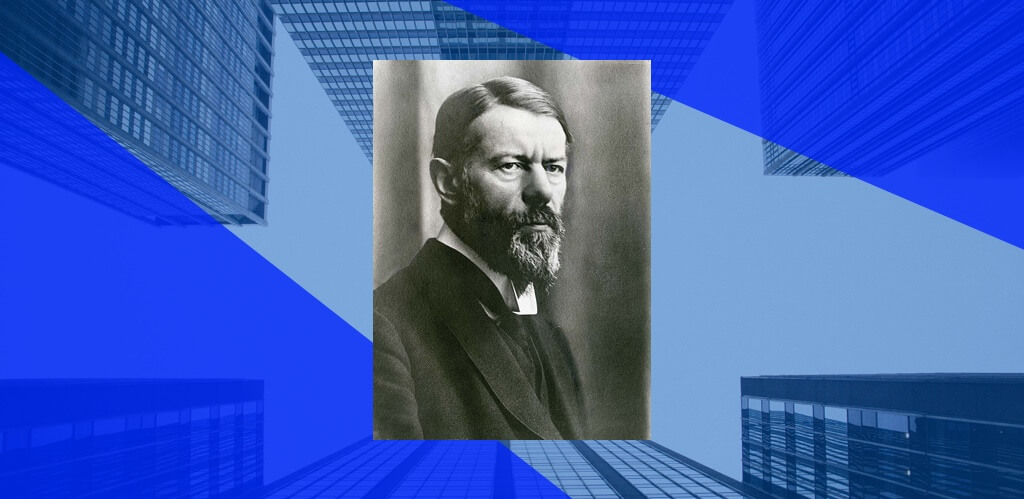What are Max Weber’s six principles of bureaucracy?
Max Weber’s six principles of bureaucracy are Specialization, Formalized rules, Hierarchical structure, Well-trained employees, Managerial dedication, and Impartiality of management.
In our time, terms like “bureaucracy” and “authority” have mostly negative connotations.
This was not the case at the start of the 20th century. In fact, when sociologist Max Weber developed his management theories detailing the “characteristics of bureaucracy,” they were considered groundbreaking and novel among academics and business managers alike.1
In spite of modern distaste for the term, most businesses are still modeled on bureaucratic principles, and most large corporations display at least some characteristics of bureaucracy, as defined by Weber.
In this article, we’re going to discuss the Management Theory of Max Weber, including the following:
Who is Max Weber?
Maximilian Carl Emil Weber (1864-1920) was born in Erfurt, Prussia. After completing high school, Weber began studying law at the University of Heidelberg at age 18. Weber then completed one year of military service before continuing his studies and practicing as a lawyer. He eventually earned his doctoral degree in law at the University of Berlin in 1889 and began working as an economics professor.2

Weber’s most prominent works came after his retirement, including “The Protestant Ethic and the Spirit of Capitalism” in 1904 and “Economy and Society” posthumously in 1922. The management-related theories that he is well-known for came in the latter of the two publications and included his Theory of Bureaucracy and the Ideal Types of Political Leadership. For these and his other contributions, Weber is regarded as one of the founding fathers of the field of Sociology.
It’s worth mentioning that while other prominent figures in the development of management theory such as Henri Fayol and Elton Mayo are primarily known within business and commerce, Weber’s contributions were unusually wide-ranging. He’s commonly cited along with Karl Marx as a key figure in the founding of sociology as a discipline.3
What are Weber’s management theories?
While Weber may be best known for his numerous contributions to the field of Sociology, he is also known for two key contributions to Management theory:
- The Theory of Bureaucracy
- The Ideal Types of Political Leadership.
We’ll take an in-depth look at each of these contributions to Management in the following sections.

The Theory of Bureaucracy
One of Weber’s greatest contributions to management theory was his Theory of Bureaucracy. This theory states that there are six principles of bureaucracy, including:
- Specialization
- Formalized rules
- Hierarchical structure
- Well-trained employees
- Managerial dedication
- Impartiality of management
The six principles of bureaucracy
First, Weber stated that a bureaucracy has specialization.4 This includes:
- Distributing and assigning specific duties to specific roles;
- Giving management the authority to give commands and providing guidelines on the methods they should use; and
- Assigning people to these roles based on merit.
When Weber spoke of formalized rules, he was speaking of what could now be described as policies and procedures. While his focus was primarily on the broad, exhaustive, and relatively stable rules that govern managers, the principle can also be applied to lower-level positions. The rules that are standardized and documented should detail the organizational structure, who is responsible for certain tasks, and how tasks are supposed to be performed. In large part, this is done so rules can be learned.5
Weber also stated that an organization should have a hierarchical structure, with one clear leader at the top. This structure should detail all of the managerial levels and which subordinate positions report to a given superior. Creating such a structure is beneficial top-down because it details who is responsible for supervising whom and bottom-up because it delineates who one should speak with if they’re looking to appeal any given decision.

Moreover, an organization should have well-trained employees. Weber states that managers should have thorough expert training, especially in the case of specialized positions, and that subordinate employees should also receive training.
Furthermore, Weber stated that a bureaucracy requires managerial dedication. Weber wrote that managers should be dedicating their “full working capacity” regardless of how long they will hold their position and always put official business ahead of other distractions.
Finally, Weber stated that there should be impartiality of management. This includes managers following the established rules and keeping business property, interests, and activities separate from personal property, interests, and activities. In particular, “individual privileges and bestowals of favor” should be avoided.
Altogether, these six principles of bureaucracy make up the “ideal bureaucracy.” Note that the word “ideal” was not used to mean “optimal” or “best”; rather, “ideal” was meant to mean “most common” or “archetypal.” Thus, these are principles by which most bureaucracies operate.
Nonetheless, Weber thought that the bureaucratic organization had a “technical superiority over any other form of organization” during his time due to its “precision, speed, unambiguity, knowledge of the files, continuity, discretion, unity, strict subordination, reduction of friction, and of material and personal costs.”6

The Ideal Types of Political Leadership
Another notable contribution from Weber was his classification system of authority, which included:
- Traditional authority
- Charismatic authority
- Rational-legal authority
1. Traditional Authority
Weber states that traditional authority comes from historical customs.7 Traditional authority requires a belief in the importance of traditions as well as respect for those who exercise authority within those traditions. If belief in a given tradition is high, people who are important to the tradition would have a high degree of status and others would follow their leadership out of respect for and loyalty to them and the tradition. Thus, submission to traditional authority happens if commands:8
- Are valid within the tradition; or, if not specific to the tradition,
- Are otherwise ethical (i.e. fair, useful, or of benefit to the majority).
Someone with traditional authority can maintain respect, compliance, and their position as long as people believe in the tradition and their commands fall within the aforementioned parameters.
Typically, leaders with traditional authority are determined based on:
- Age (gerontocracy; i.e. led by elders); and/or
- Defined inheritance (patriarchalism; e.g. a certain prince to replace a king); or
- Power (patrimonialism).
When compared to an “ideal bureaucracy,” an organization dominated by traditional authority would have the following characteristics:
- Positions are filled based on favoritism rather than technical expertise;
- Rules are “handed down from the past” or otherwise dictated by the ruler;
- An irrational hierarchy, with some specialization;
- Recruitment, selection, and promotion based on favoritism;
- A lack of technical training; and
- Fixed salaries.
2. Charismatic Authority
Weber states that charismatic authority comes from personal qualities. Charismatic authority requires a belief that a leader has exceptional capabilities and/or characteristics, whether or not they are objectively verifiable (e.g. a religious prophet versus a groundbreaking scientist). In the case of a leader with verifiably exceptional capabilities and/or characteristics, submission to charismatic authority happens out of a believed duty to:

- Recognize the leader’s personal qualities; and
- Act in accordance with their discoveries or expertise.
In order for someone with charismatic authority to maintain respect, compliance, and their position, they must continue to produce, most importantly to the benefit of their followers or “community.”
When compared to an “ideal bureaucracy,” an organization dominated by charismatic authority would have the following characteristics:
- Positions are filled based on personal qualities, which may or may not include technical expertise (depending on whether or not the leader’s capabilities and/or characteristics are objectively verifiable);
- Rules are “discovered” and made concrete by the leader as they present themselves, but routine is otherwise avoided;
- No hierarchy, but some specialization;
- Recruitment and selection based on the leader’s perception of a person’s capabilities and/or characteristics;
- A lack of technical training; and
- Minimal compensation, coming from outside donation to “the cause” (given that participation is seen as a “calling”).
It is important to note that, according to Weber, charismatic authority is revolutionary and often displaces traditional authority. This happens through the following three-step process:
- Produce a subjective/internal reorientation
- Change attitudes
- Produce a material reorientation
However, given the authority’s fluidity, charismatic authority is also likely to be displaced, eventually developing into a new traditional and/or rational-legal authority.
3. Rational-Legal Authority
Weber states that rational-legal authority comes from established rules. Rational-legal authority requires a belief in enacted rules and that the leader who is issuing commands is doing so within their assigned scope of formal responsibility. More specifically, submission to rational-legal authority happens when:
- Established rules are consistent and capable of being applied to relevant cases;
- The people involved broadly agree to obey the established rules;
- The people involved obey the established rules when and where they apply;
- The people involved are specifically obeying the rules rather than the people who enforce the rules; and
- Those who are in command are subject to the same rules.
Rational-legal authority applies to continuous rule-bound business conduct within a particular sphere or jurisdiction. Each sphere or jurisdiction requires:
- Distributed functions;
- A person granted authority over each function;
- Specific conditions to prompt enforcement within the function; and
- Clearly defined methods of enforcement.
Rational-legal authority also requires:
- Hierarchical organization, with the right to appeal to a higher authority;
- Specialized training in order to be in a position of authority;
- People with authority not to be owners of the organization and that personal and business property are kept separate;
- Positions to be filled rather than permanently owned; and
- Rules to be documented completely.
When compared to an “ideal bureaucracy,” an organization dominated by rational-legal authority would have the following characteristics:
- Positions are appointed and based on free contractual relationships;
- Rules are formal, detailed, consistent, documented, and broadly agreed upon;
- A clearly defined hierarchy;
- Recruitment and selection based on technical qualifications and promotion based on seniority, achievement, or both;
- A high degree of technical training; and
- Fixed salaries.
Analysis of Weber’s Theories and Application to Today
Nowadays, words like “bureaucracy” and “authority” have a negative connotation.
When considering these words, and Weber’s work more broadly, one has to remember the time in which they came. In fact, as management concepts, these had a positive perspective and were relatively new, codifying how to optimally structure organizations (bureaucracy) and the main types of authority (political leadership).9
In reality, while we might dislike the word “bureaucracy” at this point in time, most businesses are still rightfully modeled in this fashion due to the concept’s structure, broad applicability, and effectiveness.
Max Weber impact on tech sector
When you dive deep into the details of the Ideal Types of Political Leadership, you find another example where Weber was ahead of his time.
Potentially inadvertently, he describes the “organic structure” detailed in Contingency Theory when speaking of charismatic authority; that is, organizations under charismatic authority have inconsistent and unpredictable tasks and are thus less defined and more flexible in order to accommodate the conditions.10
This is exactly how businesses with ever-changing conditions operate today, including countless tech companies. And then, surely enough, they’re led by eccentric, “charismatic” figureheads, like Elon Musk, Steve Jobs, Mark Zuckerberg, and more.
So, the principles of Weber’s Theory of Bureaucracy still hold true to the organizations of today.
Likewise, the Ideal Types of Political Leadership relatively accurately describe the main structures of authority and the characteristics of organizations that follow.
Thus, Max Weber’s contributions are certainly noteworthy and relevant to modern students of management theory.
Article Summary
While Max Weber is best known for his work in the field of Sociology, he clearly has also made noteworthy contributions to Management as a discipline. In summary of his contributions, we covered:
- Who Max Weber was;
- The following six principles of the Theory of Bureaucracy:
- Specialization;
- Formalized rules;
- Hierarchical structure;
- Well-trained employees;
- Managerial dedication; and
- Impartiality of management.
- The following three Ideal Types of Political Leadership:
- Traditional authority;
- Charismatic authority; and
- Rational-legal authority; and
- A brief analysis of how Weber’s management theories apply to organizations today.
Although his theories are now somewhat dated, they were among the first of their kind. As such, they provided early descriptions of how organizations can create structure and produce efficiently and effectively, as well as how different styles of authority influence organizations.
Thus, Max Weber is, without doubt, one of the earliest and most important contributors to Management theory.
-
https://www.uni-erfurt.de/en/max-weber-kolleg/kolleg/profile/translate-to-english-max-weber ↩
-
https://openstax.org/details/books/organizational-behavior ↩
-
https://openlibrary.org/works/OL1362879W/From_Max_Weber_essays_in_sociology?edition=frommaxweberessa00webe ↩
-
https://openlibrary.org/books/OL5071877M/Economy_and_society ↩
-
https://openstax.org/details/books/introduction-sociology-3e ↩
-
https://www.bcg.com/en-ca/publications/2020/changing-business-environment-pushing-end-to-bureaucracy ↩
-
https://web.archive.org/web/20200925070714if_/https://www.economist.com/news/2009/01/09/max-weber ↩


 Business Management Theory and Philosophies Explained
Business Management Theory and Philosophies Explained